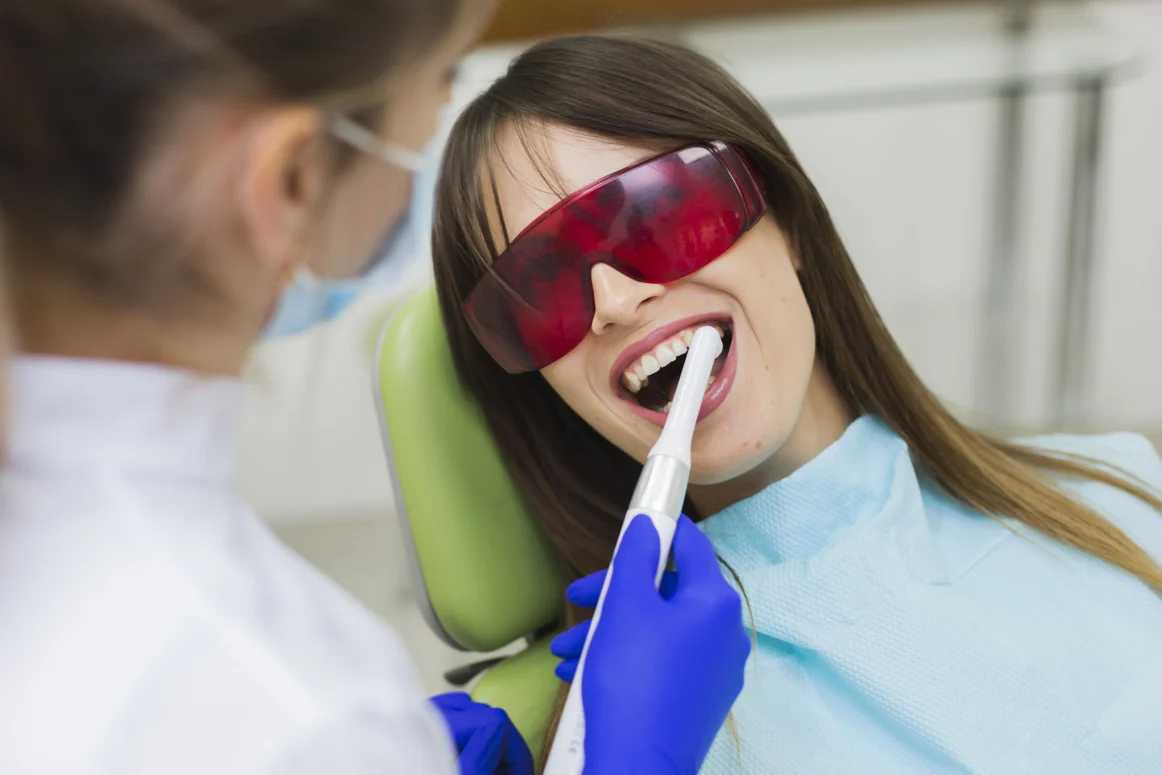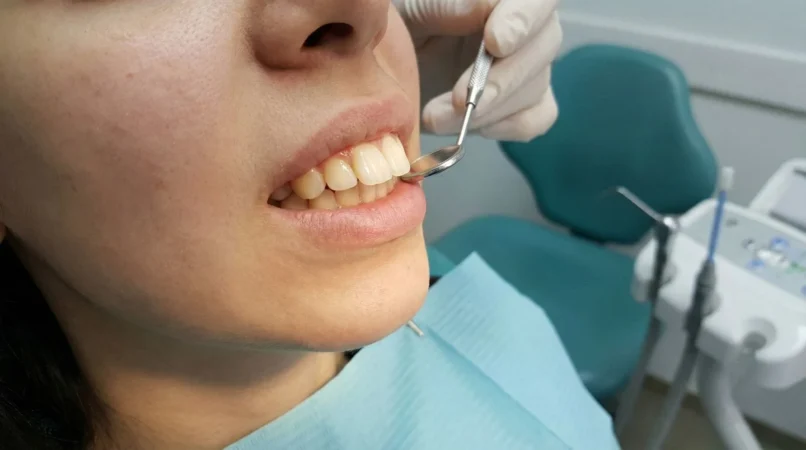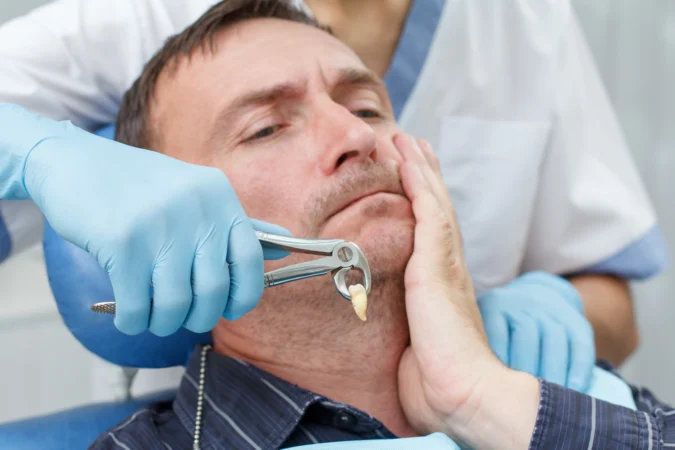Table of content
In all honesty…
No one is attracted to yellow teeth. In fact, people believe yellow teeth are caused by dirtiness and uncleanliness.
But sometimes, yellow teeth are caused by factors beyond our control.
Or they remain yellow no matter how often or how long you brush them for.
The good news is that your teeth no longer have to remain yellow. There are different at-home or in-office remedies to make your teeth white.
Homemade solutions have their limits, though, which is why people are flocking to Turkey — one of the most advanced countries in cosmetics on the planet — for professional teeth whitening.
And with the rise of medical tourism, clinics in Turkey are now making advanced treatments more accessible to people from all around the world.
Why Do Teeth Become Discolored?
Teeth discoloration is of two types.
- Surface or extrinsic stains: These are easier to polish off or bleach away. They are caused by external sources like smoking and colored food.
- Deep stains or intrinsic stains: They are caused by factors like aging and genetics and require stronger treatments to remove. Before you go for teeth whitening, you should speak with your dentist. That way, you know what teeth whitening procedure to opt for.
That said, here are the main reasons why your teeth turn yellow:
- Food and Drinks
When you take coffee, berries, red wine, or other colored foods, you stand a chance of staining your tooth enamel. In the beginning, they only cause surface stains, but if you don’t brush frequently, they can become more permanent.
- Lifestyle & Habits
Smoking or chewing tobacco is another major culprit of teeth discoloration. Apart from them, if you don’t brush or floss frequently, plaque can build up on your teeth. Over time, this causes your teeth to look darker.
- Getting Older
You may have noticed that older people’s teeth look darker. This is because, as you get older, your tooth enamel thins over time and wears off. When this happens, the dentin underneath, which is much darker, becomes visible. This may cause your teeth to appear yellowish.
- Health Conditions and Medications
Antibiotics like tetracycline can also cause your teeth to look darker. Apart from these, cancer treatments like chemotherapy or radiation can cause teeth discoloration.
Also, too much fluoride can cause a condition called fluriosis. Fluriosis affects the appearance of your teeth, causing them to look spotted or have faint white markings.
- Genetics
Some people just have naturally dark dentin or thicker enamel. It’s not due to poor brushing habits or lifestyle choices. No matter how much they brush or floss, their enamel will always appear less bright. This is not tied to any condition or factor, just good old DNA.
How Can You Make Teeth Whiter at Home?
Teeth whitening can be done at home, too. Here’s how you can whiten your teeth at home:
- Brush Your Teeth Regularly
This should be a no-brainer. Some foods and drinks can make your teeth yellow. You should always brush after eating to prevent this.
Dentists recommend brushing 30 minutes after eating, especially when you eat acidic foods. That way, you don’t brush away bits of enamel while the acid is still reacting.
You can try brushing with toothpastes or strips that contain hydrogen peroxide or mild abrasives. Whitening toothpastes will get rid of surface stains on your teeth. Whitening strips may lighten your teeth by a few shades over time.
- Oil Pulling
This method is believed to help with overall oral health, and is not a teeth whitening solution per se. Ancient Indians believed that swishing oil around in the mouth helps to get rid of bacteria. Bacteria cause plaques, and plaques may cause your teeth to turn yellow.
The way this method is supposed to work is that by getting rid of this bacteria, your teeth stand a chance of getting whiter. However, oil pulling is not supported by any real medical evidence.
Oil pulling is mostly done with coconut or sesame oil. And to do this, put a tablespoon of coconut oil in your mouth and swish it around for about 20 minutes. Spit out the leftover stuff and rinse your mouth well with warm water. You can also brush your teeth afterward to get rid of any leftovers.
- Fruits with citrus
Another method that hasn’t been proven by science is to rub the peels of citric fruits like oranges or lemons across your teeth for a few minutes. This is thought to temporarily whiten your teeth.
The way this method ‘whitens’ your teeth is that the citric acid from the peels interacts with your teeth and dissolves away bits of your teeth enamel.
This method is not advisable for people with sensitivity issues. This is because your tooth enamel is supposed to protect your teeth from cavities, bacteria, and damage. When you dissolve parts of it, you can get allergic reactions or irritations, increasing your risk of cavities. Beyond this, we’ve not found enough scientific evidence backing it.
- Banana Peels
Banana is not a citric fruit, but the peel can produce acid and minerals like potassium and magnesium. These have the tendency to remove stains from your teeth with consistent use.
- Baking Soda and Lemon Juice
Baking soda is abrasive in nature. This abrasiveness helps scrub away dirt and grime. Lemon, on the other hand, has acidic properties that dissolve grease and other dirt. Combining the two gives you an efficient homemade whitening remedy.
Simply mix a few teaspoons of baking soda with lemon juice and brush your teeth with it. That way, you scrub away surface stains. Some people claim that baking soda may be too harsh on your teeth enamel. However, this 2017 research debunked this and proved that they’re safe for everyday use. If you have worries about the acidity of lemon, you can substitute the lemon juice for water.
- Hydrogen Peroxide
Hydrogen peroxide is usually combined with baking soda to whiten teeth. Its bacteria-killing and bleaching properties make it right for this.Note: Home-made teeth whitening options can not be compared to professional methods. Professional methods shine brighter and have more permanent results.
Professional Ways of Making Your Teeth White
Dental clinics in Turkey provide ways of making your teeth white with cosmetic technology. They include:
- In-Office Whitening
This is usually one of the fastest and most effective methods. It involves going to your dentist’s office, where they apply highly concentrated bleaching agents to make your teeth brighter.
Depending on the procedure they opt for, the dentist may use light or heat to boost the process. Usually, they use a combination of the two (ultraviolet or LED light). That way, you see results faster, with your teeth getting several shades (up to 8 shades) brighter, sometimes in a single session.
- Laser Treatment
This method is similar to the previous one. It involves a combination of whitening agents and laser technology. Dentists have access to chemicals with higher concentrations of hydrogen peroxide. They use these to make your teeth whiter in a controlled way.
After applying the whitening gels, they shine a laser light on your teeth to accelerate the whitening process. The result is a dramatic improvement in as little as 30-60 minutes.
- Take-home Kit
Your dentist can give you a custom-made whitening kit that fits over your teeth perfectly. These whitening kits are different from over-the-counter brands you may be used to. They’re safer and more superior with visible, natural results in 1-2 weeks. These kits have LED lights or heat lamps inside the mouthguard to activate or boost the effect of the whitening agents.
- Veneers
These should serve as a last resort if you have heavily stained teeth. This is because veneers don’t actually whiten your teeth. The way they work is that your dentist scrapes off part of your tooth enamel and replaces it with a tooth-shaped shell. This means they do not apply any teeth whitening agent.
This artificial layer or shell makes your teeth appear brighter and whiter. Just like fixing an artificial nail over a fingernail.
Habits and Lifestyle Changes to Keep Your Teeth White
Teeth whitening solutions are only half the fix. If you don’t stain your teeth in the first place, you never have to worry about whitening them. Incorporate these healthy lifestyle choices to keep your teeth whiter for longer:
- Quit Smoking or chewing tobacco. This includes cigarettes or vapes.
- Visit your dentist regularly for cleaning and checkups. You should also go for touch-ups where necessary in order to prolong your teeth whitening results.
- Rinse your mouth with water after eating staining foods like red wine, coffee, or berries.
- Floss to remove food particles that can stain between your teeth.
- Brush at least twice daily.
- Eat high-fiber foods and vegetables like broccoli, spinach, and apples. They help to eliminate plaques and increase your saliva flow.
How to Tell If You Should Get Your Teeth Whitened?
You’re a good candidate for teeth whitening if you fall into these categories:
- You have healthy teeth: Teeth whitening is not recommended for diseased gums. This is because they may not be strong enough to handle the teeth bleaching process. To qualify for teeth whitening, you should have no major dental problems.
If you have dental problems, speak with your dentist and they’ll advise you on the best available options.
- You have no baby teeth: Teeth whitening is not advisable for kids or teenagers whose permanent teeth have not set in yet. This is because the pulp chambers of baby teeth are bigger than those of the permanent teeth. Irritation and other complications may occur.
- You have yellow or darker teeth: The idea behind teeth whitening is to make yellow teeth whiter. Therefore, if you’re looking for a solution to your yellowed teeth, then teeth whitening may be for you. Of course, you should consult a dentist to know what option is best for you.
- You don’t have restorations: If you have dental bonding, crowns, or fillings, you should consult a dentist first. Teeth whitening does not work on these restorations. Therefore, if you plan to get teeth restorations, consider getting your teeth whitening done first.
What to Know Before Going for Teeth Whitening?
- Tooth Sensitivity: It’s normal to experience mild sensitivity, especially from exposure to hot or cold temperatures. This is just temporary, though, and your teeth and gums will be back to normal in no time.
- Be Realistic: Teeth whitening is not a magic solution, and you should not expect perfect results. You can, however, expect them to get a few shades brighter.
Frequently asked questions
How Much Does Teeth Whitening Cost In Turkey Compared To The UK And US?
Professional teeth whitening in Turkey is much more affordable than in the UK and US, where treatments can cost up to $1,000. Moreover, in addition to high-quality care, Turkey offers the bonus of exploring its rich culture and beautiful attractions. Therefore, it is an ideal destination for dental treatments.
How Long Does A Teeth Whitening Session Take?
A teeth whitening session may last from 1 to 2 hours. However, some cases may involve multiple sessions.
Is Professional Teeth Whitening Safe?
Yes, teeth whitening at Dentspa is safe. Our dentists will take necessary precautions to protect your gums and other oral tissues during and after the procedure.
Do you want a brighter and more attractive smile?
Do you have tough stains on your teeth that you can’t seem to get rid of? If this describes you, you are an excellent candidate for professional teeth whitening.
How Does Professional Teeth Whitening Work?
Professional teeth whitening typically involves the application of a bleaching substance to the teeth, such as hydrogen peroxide or carbamide peroxide. This substance dissolves spots on the enamel, giving it a whiter appearance.

















 70%
70% 

